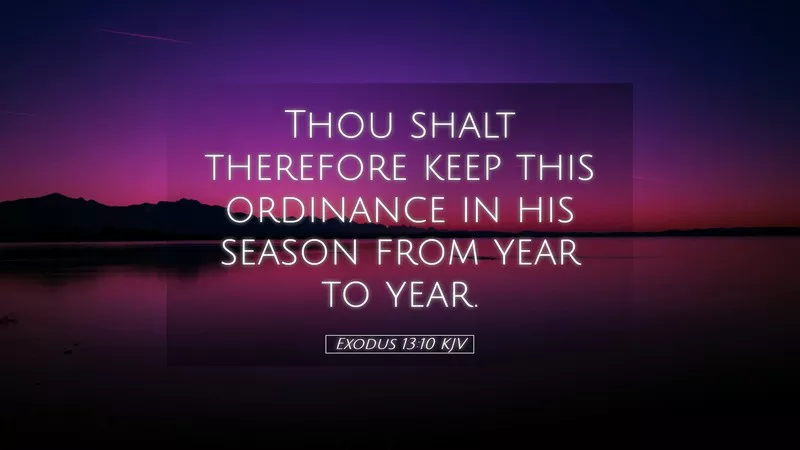Read the Daily Bible Verse – Exodus 13:10 To Strengthen Your Spiritual Journey.
Exodus 13:10 in the King James Version (KJV) reads:
“Thou shalt therefore keep this ordinance in his season from year to year.”
This verse serves as a directive from God to the Israelites, emphasizing the importance of observing the Feast of Unleavened Bread annually as a perpetual reminder of their deliverance from Egypt. It highlights the ongoing commitment required of God’s people to remember and honor His mighty acts.
The Context on Exodus 13:10 KJV
Historical and Cultural Background
The Book of Exodus recounts the liberation of the Israelites from Egyptian bondage, a foundational event in their identity as God’s covenant people. After the final plague—the death of the firstborn—Pharaoh released the Israelites, marking the beginning of their journey to freedom (Exodus 12:29-33).
The Feast of Unleavened Bread was instituted as part of the Passover celebration (Exodus 12:14-20). This seven-day observance involved eating bread without leaven, symbolizing the haste with which the Israelites left Egypt. It also represented purity and separation from sin.
Immediate Context of the Verse
Exodus 13 provides further instructions regarding this feast. Verses 3-10 emphasize the need to remember God’s deliverance and teach future generations about His mighty acts. Verse 10 concludes this section, affirming the perpetual nature of this ordinance. By observing it annually, the Israelites would keep the memory of their deliverance alive and maintain their covenant relationship with God.
The Meaning of Exodus 13:10
A Call to Faithful Observance
The phrase “keep this ordinance” refers to the detailed instructions surrounding the Feast of Unleavened Bread. This was not a one-time event but a yearly practice that was to be carried out “in his season,” or at the appointed time, every year.
Perpetual Remembrance
The verse underscores the importance of continual remembrance. By commemorating their deliverance from Egypt, the Israelites acknowledged God’s power, faithfulness, and their dependence on Him. This practice was designed to reinforce their identity as His chosen people and their covenant obligations.
A Sacred Obligation
The command to observe this ordinance highlights the sacred nature of remembering God’s works. It was not merely a cultural tradition but a spiritual act of worship and obedience.
Exodus 13:10 Application in Life
The Importance of Spiritual Disciplines
For Christians, this verse reminds us of the value of regular spiritual practices, such as prayer, Bible study, and partaking in Communion. These disciplines help us remember God’s faithfulness and maintain a close relationship with Him.
Cultivating Gratitude
Annual observances like the Feast of Unleavened Bread were designed to foster gratitude. Similarly, modern believers can cultivate gratitude by regularly reflecting on God’s goodness and provision in their lives.
Teaching Future Generations
Exodus 13:10 emphasizes the intergenerational aspect of faith. Just as the Israelites were to teach their children about the Exodus, Christians are called to pass on their faith by sharing God’s works with their families and communities.
Comparison with Other Biblical Texts
Old Testament Parallels
Exodus 12:14: This verse establishes the Passover as a memorial feast, linking it to the Feast of Unleavened Bread. Both passages emphasize the perpetual observance of these events as acts of remembrance and worship.
Leviticus 23:4-8: The instructions for the Feast of Unleavened Bread are reiterated here, highlighting its importance within Israel’s liturgical calendar.
New Testament Connections
Luke 22:19: Jesus, during the Last Supper, commanded His disciples to partake of the bread and wine in remembrance of His sacrifice. This practice mirrors the concept of annual remembrance found in Exodus 13:10.
Hebrews 10:23-25: This passage encourages believers to hold fast to their faith and gather regularly to encourage one another. Just as the Israelites observed annual feasts, Christians are called to maintain regular fellowship and worship.
Modern-Day Relevance
The Role of Tradition
Exodus 13:10 underscores the importance of tradition in preserving faith and identity. For Christians, traditions like Christmas, Easter, and Communion serve as reminders of God’s works and help maintain a sense of spiritual continuity.
The Need for Reminders
In a fast-paced world, it is easy to forget God’s faithfulness. Observing spiritual disciplines and commemorating significant events in our faith helps keep God at the center of our lives.
Community and Worship
The Feast of Unleavened Bread was a communal event, fostering unity among the Israelites. Similarly, Christian observances bring believers together to worship and remember God’s works, strengthening the body of Christ.
Conclusion
Exodus 13:10 serves as a powerful reminder of the importance of remembering and honoring God’s works. By commanding the Israelites to observe the Feast of Unleavened Bread annually, God ensured that His deliverance would be central to their faith and identity.
For Christians, this verse challenges us to cultivate a lifestyle of remembrance and gratitude. Whether through personal spiritual disciplines, communal worship, or teaching others about God’s works, we can keep His faithfulness at the forefront of our lives.
In a world that often prioritizes the present, Exodus 13:10 calls us to look back with gratitude, live faithfully in the present, and pass on our faith to future generations. Through these practices, we honor God and remain rooted in His unchanging love and faithfulness.
Exodus 13:10 Commentary
Jewish Perspectives
In Jewish tradition, Exodus 13:10 is part of the foundation for annual observances such as Passover and the Feast of Unleavened Bread. These celebrations are not only acts of remembrance but also opportunities for teaching and renewal of faith.
Christian Interpretations
Christian commentators often draw parallels between the Feast of Unleavened Bread and the Lord’s Supper. Both are seen as opportunities to remember God’s deliverance—first from Egypt, and later through Christ’s sacrifice on the cross.
Theological Themes
Faithfulness of God: The command to observe this ordinance reflects God’s desire for His people to remember His faithfulness.
Covenant Relationship: The observance of the feast was an act of covenant faithfulness, reaffirming the Israelites’ commitment to God.
Intergenerational Faith: By instructing the Israelites to teach their children, God ensured that His works would be remembered and celebrated for generations.
You Might Be Interested In:

